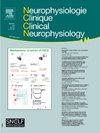How can emotion and familiarity improve own-name oddball paradigms?
IF 2.4
4区 医学
Q2 CLINICAL NEUROLOGY
Neurophysiologie Clinique/Clinical Neurophysiology
Pub Date : 2025-01-31
DOI:10.1016/j.neucli.2025.103050
引用次数: 0
Abstract
The own-name paradigm is used to assess the depth of consciousness disorders in patients in intensive care units. This auditory oddball paradigm elicits a positive event-related potential at 300 ms (named P300) after the presentation of a deviant auditory stimulus, here the subject's own-name. This P300 likely reflects the neural processing of the novel stimulus, which can trigger a behavioral response. Presence of a P300 response is considered to be indicative of a good prognosis for recovering to wakefulness in post-anoxic coma patients. However, its prognostic performance is insufficient and some disorders of consciousness patients without a P300 response will nevertheless awake. The auditory P300 response is influenced by the acoustic characteristics of the stimuli. The use of stimuli with an emotional valence may recruit additional brain networks besides the auditory and attentional ones and potentially improve the prognostic value of the P300 response. Moreover, better characterization of the recruitment of different brain networks involved in these P300 responses in response to emotional stimuli would help in understanding the surface event-related potentials. Here, we present two kind of emotional acoustic features that can be used in these paradigms: “smiling” versus “rough” voice and the familiarity of the voice.
情感和熟悉度如何改善自己的名字古怪的范式?
自名范式用于评估重症监护病房患者的意识障碍深度。在出现异常的听觉刺激(这里是被试自己的名字)后300毫秒,这种听觉怪异范式引发了一个积极的事件相关电位(称为P300)。这个P300可能反映了神经对新刺激的处理,它可以引发行为反应。P300反应的存在被认为是缺氧后昏迷患者恢复清醒的良好预后的指示。然而,它的预后表现不足,一些没有P300反应的意识障碍患者仍然会醒来。听觉P300反应受刺激的声学特性影响。使用具有情绪效价的刺激可能会在听觉和注意网络之外招募额外的大脑网络,并可能提高P300反应的预后价值。此外,更好地描述在情绪刺激下参与P300反应的不同脑网络的募集将有助于理解表面事件相关电位。在这里,我们提出了两种可用于这些范式的情感声学特征:“微笑”与“粗糙”的声音和声音的熟悉度。
本文章由计算机程序翻译,如有差异,请以英文原文为准。
求助全文
约1分钟内获得全文
求助全文
来源期刊
CiteScore
5.20
自引率
3.30%
发文量
55
审稿时长
60 days
期刊介绍:
Neurophysiologie Clinique / Clinical Neurophysiology (NCCN) is the official organ of the French Society of Clinical Neurophysiology (SNCLF). This journal is published 6 times a year, and is aimed at an international readership, with articles written in English. These can take the form of original research papers, comprehensive review articles, viewpoints, short communications, technical notes, editorials or letters to the Editor. The theme is the neurophysiological investigation of central or peripheral nervous system or muscle in healthy humans or patients. The journal focuses on key areas of clinical neurophysiology: electro- or magneto-encephalography, evoked potentials of all modalities, electroneuromyography, sleep, pain, posture, balance, motor control, autonomic nervous system, cognition, invasive and non-invasive neuromodulation, signal processing, bio-engineering, functional imaging.

 求助内容:
求助内容: 应助结果提醒方式:
应助结果提醒方式:


